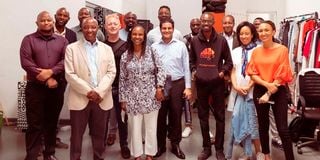How mentorship helped startups thrive in shaky market

Wandia Gichuru is the founder of Vivo Fashion Group.
What you need to know:
- Vivo Fashion Group owns 25 stores in Kenya, Uganda and Rwanda.
- The group employs over 450 people, of which more than 70 per cent are women and youth.
In December 2017, Wandia Gichuru, the founder of Vivo Fashion Group and Shop Zetu, joined the Endeavor high impact entrepreneurship programme as the first female entrepreneur from Kenya.
Over a six-month assessment period, she would interact with entrepreneurs whose businesses were at a more advanced stage than hers, comparing notes on what strategies she could pursue to take her business to the next level.
“I met and spoke to over 60 entrepreneurs and business people from across the globe. I would share our strategy and plans and they would give me feedback and advice. This really helped us to refine and improve our business plan,” said Wandia during an interview with Powering SMEs.
Six years later, the Vivo Fashion Group owns 25 stores in Kenya, Uganda and Rwanda. Overall, the group employs over 450 people, of which more than 70 per cent are women and youth under the age of 30.
The firm also has an online selling platform known as Shop Zetu, where shoppers can purchase from several brands at once, paying one shipping fee, and receiving items in one order. It currently carries over 350 brands, most of which are local.
Before it grew to this level, the business was operating as a small fashion brand from the Junction Mall in Nairobi under the name Vivo Woman. Back in 2011, Wandia started importing fitness and dance clothing for women.
“I wanted to inspire women to lead more active and healthy lives, but quickly expanded the brand’s offerings to include regular smart casual and casual clothing, targeting professional women aged 35 years and older,” noted Wandia.
The only problem with dealing with imported products was that most global fashion brands designed for a very euro-centric body shape, size and skin tones.
Local customers wanted silhouettes that complimented their body shapes, others wanted outfits with bright colours and loud prints. Therefore, in 2013, she decided to start designing and manufacturing locally.
“For me, that was the most important and exciting change to our business model. At the time, most local garment manufacturers were focused on producing uniforms and corporate apparel,” noted Wandia.
Shortly after transitioning, the business started to grow, but Wandia was not fully prepared for this. Creating a management structure to support the growth proved to be a challenge.

The Endeavor network during a visit to the Vivo Fashion Group factory.
“As the founder, I was no longer able to manage all processes myself and we suffered from weaknesses and gaps in our system. Today, although we still face challenges in creating structures and processes to support the foundation of the business, we are in a much stronger position to scale,” noted Wandia.
Through the endeavor programme, she received advice from mentors on how to effectively manage the business.
Some of these mentors have continued to offer her advice on how to manage the effects of external shocks to her business, such as the weakening of the shilling.
All their revenues are in local currency; therefore, it becomes expensive for them to source raw material in hard currency.
“Endeavor has walked closely with us on our business journey, including through the tough Covid-19 period, where they helped us pivot our business towards selling online and introducing a B2B business line. We now want to grow the export side of our business,” Wandia said.
Coaching and development programmes such as Endeavor play a crucial role in accelerating the growth of small and medium sized enterprises during critical phases.
Not only do they offer access to potential investors, but also provide firms with mentorship opportunities from experienced entrepreneurs, investors, and industry veterans.
“To be successful as an entrepreneur, you need a strong network of investors who can help you raise money, a network of mentors who can guide you through the entrepreneurial journey and a network of key stakeholders with government connections,” says Benjamin Njenga, co-founder of Apollo Agriculture.
Apollo joined the Endeavor programme at a time when the company was expanding its operations into Zambia. The firm, which facilitates smallholder farmers with access to inputs, agro-training and insurance, had identified Zambia as a good market to grow their business.
“In Kenya, our major season is usually January to April when we have long rains. The problem was we were generating revenue the first part of the year only. When we were expanding, we wanted to see which country can be an offset.The season in Zambia is usually in October so we would be able to do two major seasons in a year,” said Njenga.
They would leverage Endeavor's networks in Zambia to navigate the government regulations as well as get partners to work with.
Out of over 300,000 farmers they assisted financially last year, 10,000 were from Zambia. The farmers from Kenya had a loan portfolio of about Sh3.7 billion.
“At times farmers cannot access products such as loans from banks, not because there are no facilities, but because the farmers are very hard to reach, even rural distribution of inputs is a challenge because of poor supply chain networks. We leverage satellite imagery, machine learning and mobile money to deliver products to small holder farmers,” noted Njenga.
Like Apollo, yet another company, Copia joined the Endeavor programme at a critical stage when they needed support to expand their operations.
The e-commerce firm had identified a gap where consumers, especially those living in rural Kenya, could not get access to well-priced, top-quality, reliably delivered products and services.
“This was mainly because they could not access the internet or the cost of delivery was too high. We wanted to build a business that would bring ecommerce to that previously unserved consumer, which represents the bulk of the consumers in Kenya who can’t access modern trade supermarkets,” noted Tim Steel, CEO of Copia.
Filling this gap wasn’t going to be cheap, therefore about five years ago, one of their investors introduced them to the Endeavor programme.
“We were lucky to receive an investment from the Endeavor Catalyst Fund, which invests in businesses that they believe can have a significant impact on societies in which they operate,” noted Tim.
Today, Copia handles more than a million orders a month from over half a million customers across Kenya. 70 per cent of the deliveries are off-road.
The firm employs around 1,400 people, around 800 drivers and driver assistants, and 50, 000 agents, 81 per cent of whom are women.
“Most of our agents are recruited from the small businesses or even individuals in the locations where we want to extend the Copia service to consumers. Commonly, our agents are hair dressers, tailors, mobile money agents, café and hotel owners. They are able to increase their earnings by doubling as our agents,” noted Tim.





